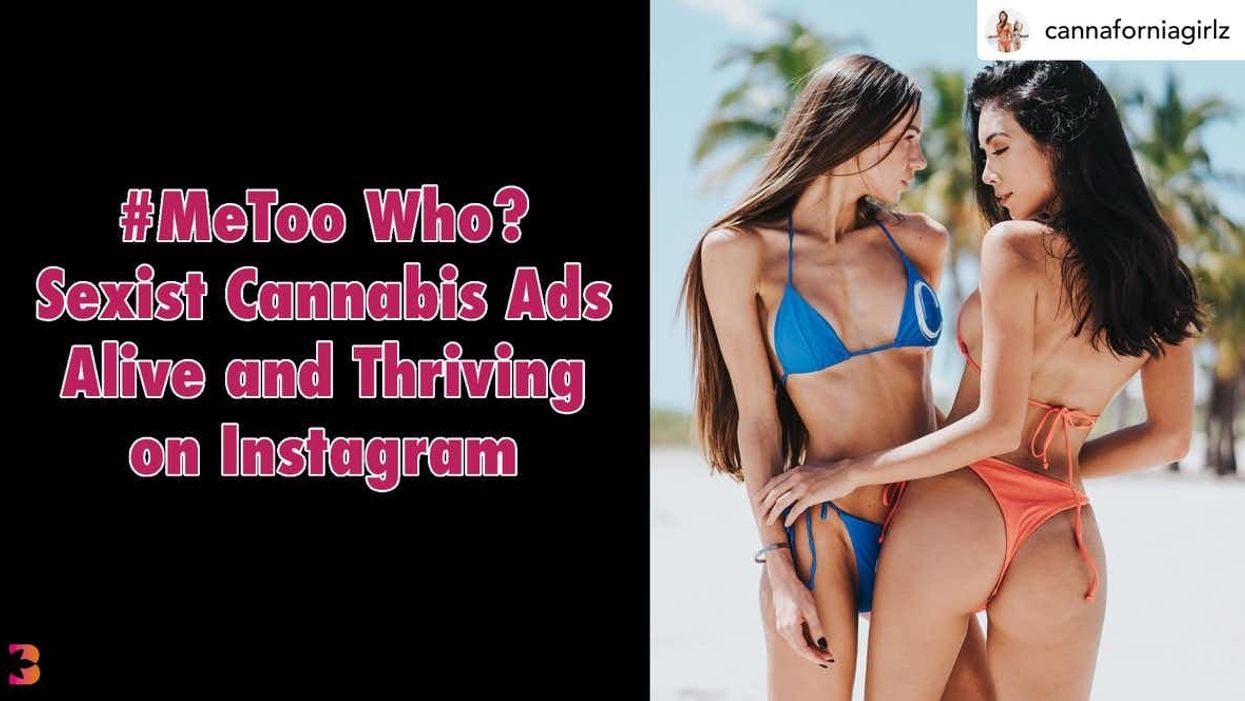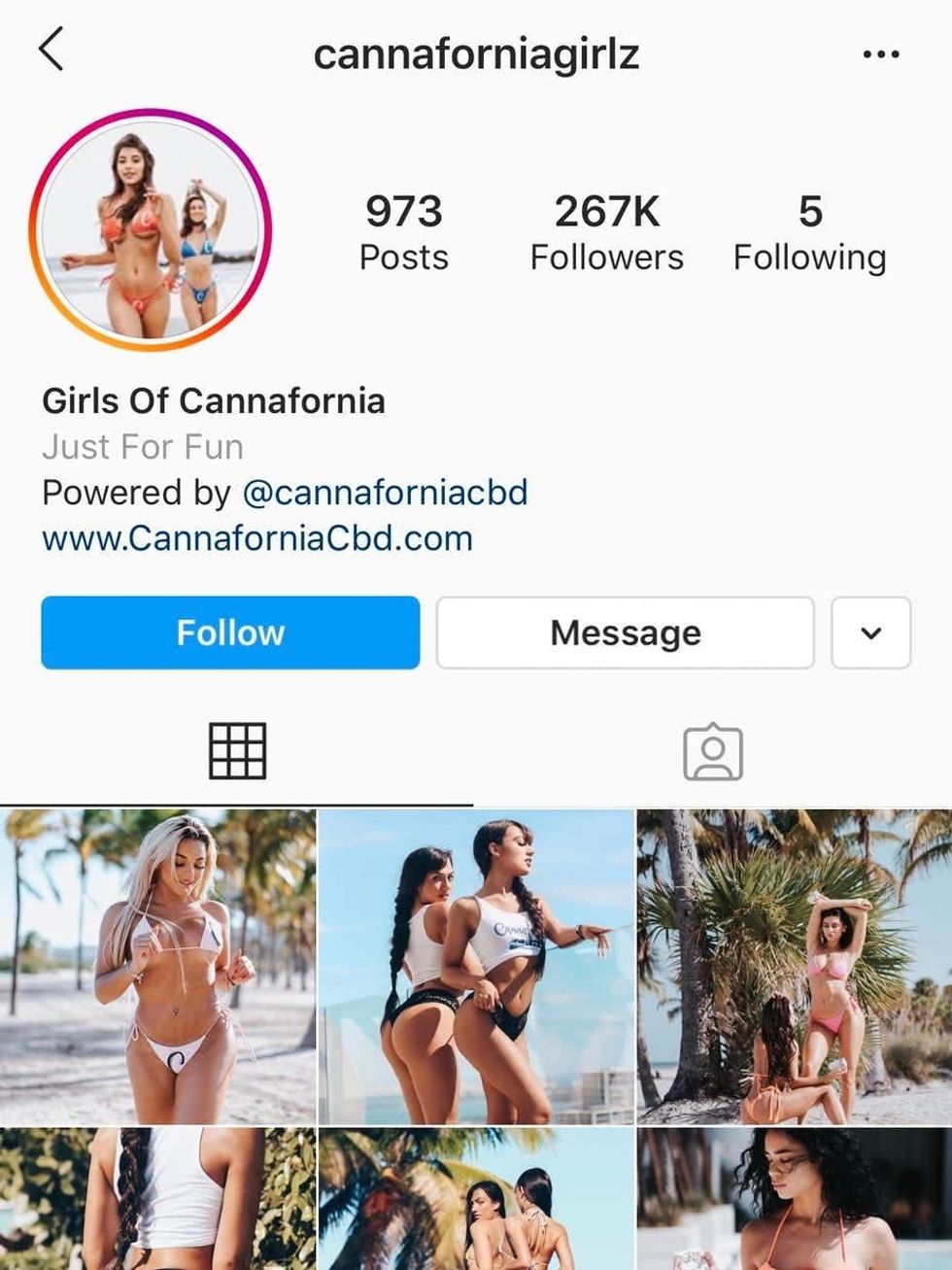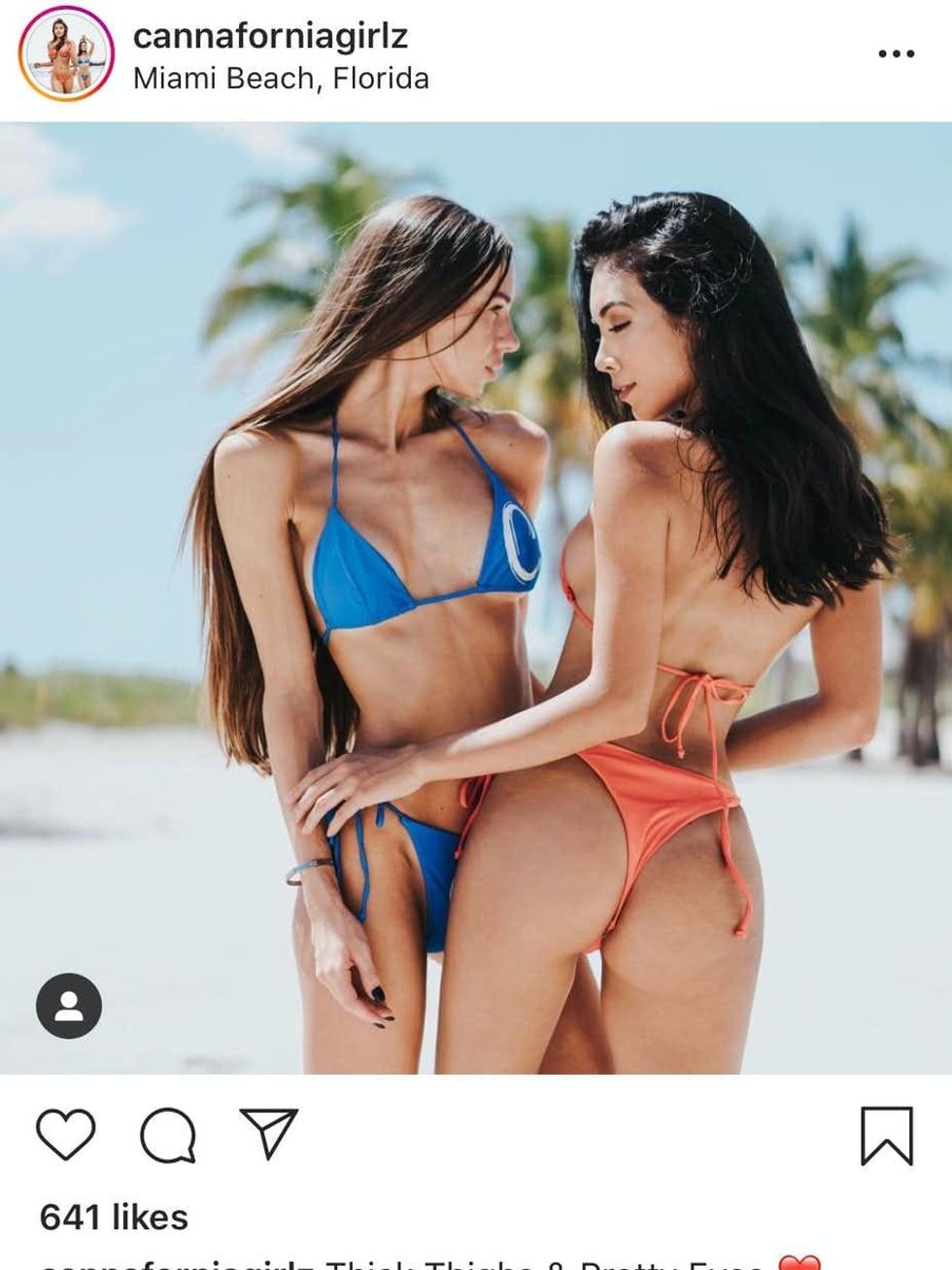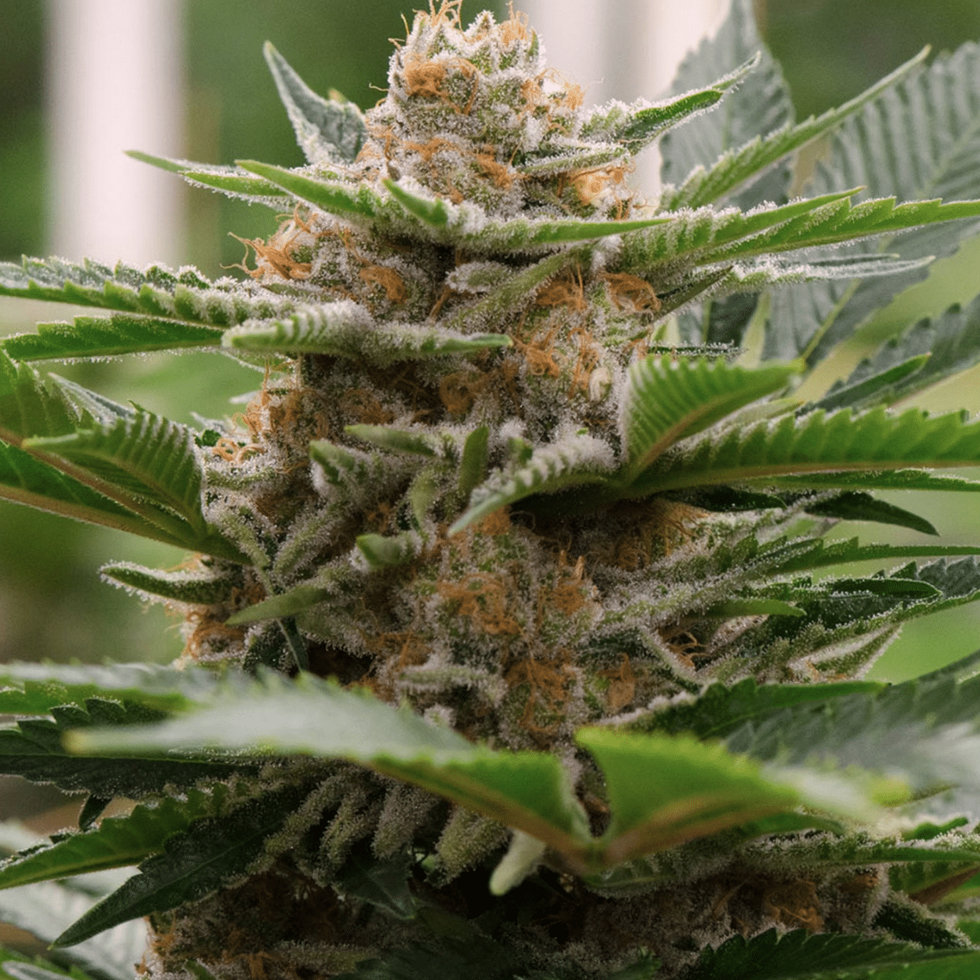Sign up for theBluntness newsletter for all your latest cannabis news.
Some cannabis execs are still stuck on “sex sells” marketing strategies, and some industry and marketing professionals are wondering what they’re toking.
#MeToo Meets Legalization
In October 2017, Harvey Weinstein’s first accusers came forward and the #MeToo movement was born. Three months later, recreational use retail stores opened their doors across California.
Overnight, it seemed, Santa Monica Boulevard and other Hollywood streets were plastered with cannabis billboards. It quickly became clear cannabis wasn’t the most controversial content in some of those advertisements but, rather, the sexualized depictions of women in them
VICE published an article in February 2019 calling out cannabis company Ignite after the company’s “Nice Grass” campaign featuring women in bikinis and lingerie sparked controversy city-wide.
A number of industry professionals condemned the ads. Beyond sexy, professionals said, these ads were blatantly sexist.
These billboards went up in Weinstein’s old stomping grounds in a town with a burgeoning cannabis industry. According to a study by Eaze published in “Dope Magazine,” the cannabis consumer base is 38% female. Surely after the VICE exposé, cannapreneurs might think twice before replicating Ignite’s marketing, right?
Wrong.
From Hollywood Intersections to Instagram
Steeped in a culture of sharing, cannabis seems a natural fit in the realm of social media, with a particular focus on Instagram. On the platform, however, advertisers face strict cannabis advertising policies.
Instagram states it: “doesn’t allow people or organizations to use the platform to advertise or sell marijuana, regardless of the seller’s state or country.”
What Instagram states in practice isn’t always the case on the platform - inconsistent enforcement rules against cannabis advertising have left cannabis brands in a strange limbo. Even CBD isn't safe in the digital jungle of cannabis Instagram.
Many companies find themselves in a cycle of building and rebuilding their communities, as reported by Forbes. Over time, digital marketers have creatively found workarounds to avoid banning, with many focusing on lifestyle over product-centric posts.
The lifestyle some cannabis brands have chosen to focus on to promote their cannabis products echoes the tone of Ignite’s billboards. In fact, Ignite has replicated its advertising tactic on the social media platform. It maintains a community that showcases minimal cannabis and maximum skin, stopping just short of Instagram’s other policy banning nipples.
Cannabis company Cannafornia appears to be taking a similar approach with its CBD brand Cannifornia CBD. In addition to its CBD-focused Instagram, @cannaforniacbd, the company maintains another account that is “powered” by @cannaforniacbd - @cannaforniagirlz.
Whether the intention behind this sexualized approach to selling CBD is an attempt to evade strict unpredictable social media rules or a deliberate choice in the same vein as Carl’s Jr.’s racy ads from 2015 is unclear. That said, the choice is an interesting one for a product with a diverse, heavily female consumer market in a post #MeToo climate.
Pass The Blunt - Cannabis and Marketing Pros react
theBluntness.com reached out to several cannabis and marketing professionals in the United States and Canada to get their take on Cannafornia's Instagram posts and use of sex in cannabis advertising in general.
Toronto, Ontario based Sarah Hanlon is a Canadian cannabis advocate, media expert and host for various outlets including digital cannabis magazine, Lift & Co.
When she saw the Cannafornia CBD ads, Hanlon said she saw a discrepancy between the company’s stated values and imagery it chose as a centerpiece of its brand identity.
“The slogan on their website reads: ‘CBD for the people. Made in California. Loved by all,'" she noted.
In addition to “transparency,” “accessibility, “education,” “inclusivity,” and “advocacy,” Cannafornia CBD's website does, in fact, list “inclusivity” as one of its core values:
“We want to reflect our customers and we believe that people of every gender, race, religion, ethnicity, and sexual preference should have access to CBD products. We are proud to have a rapidly growing and wonderfully diverse team spread throughout the United States."
Despite the company's focus on inclusivity, "clearly, they are marketing to a very specific market who see women in a very narrow way and who see them as things to be desired," Hanlon said.
Social Media Marketer Marissa Breton has worked for various brands throughout her career.
Breton said she found the company's Instagram posts to be “completely reductive and entirely developed through the male gaze. As a woman, I want to support other women in this industry," she said. It’s clear female intellect isn't valued at this type of company,” adding that “this marketing would 100% deter me from purchasing product.”
From the male perspective, another seasoned social media marketer, Frank Emanuele, who works at a Fortune 100 company, said he was less than impressed with Cannafornia CBD's approach.
“[The Instagram advertising is] unabashedly sexist and gratuitous," he told theBluntness. "They’re not even hiding from it. There’s no clever marketing strategy. It’s a ham-fisted, cynical approach to selling.”
The marketers we spoke with had all had the same take, calling the Instagram posts sexist and ineffective.
Beyond her initial reaction to the advertisement, Hanlon reflected on her thoughts about the state of the cannabis industry as a whole.
“I used to think the cannabis industry could stand out on its own and be different,” Hanlon said. “[I thought] it could be 'better' than other industries because cannabis can be healing and because it felt like we were kind of starting fresh.”
Despite her high hopes for the industry since legalization in Canada and moves toward legalization in the United States, Hanlon said the reality has fallen short.
“I have since changed my mind [on the topic of cannabis being more progressive]. The...industry does not exist in a bubble, and so it faces the same injustice we see all over,” she said.
Though she is disappointed to see some cannabis companies taking an outdated, sexist approach to their marketing, Hanlon is still motivated and believes the industry and society can evolve.
“We must change our systems to make real change, and it must be accessible to everyone across industries and income brackets, all races...genders and all abilities,” she said. “Then, when there is a diversity within the workplace at all levels, hopefully we will see a diversity within the ad space...Then, maybe, we can do away with marketing all together!”
As long as cannabis companies keep their ads nipple and bud free, it appears culture has not yet caught up with cannabis advertisers. Sex as a sales tactic still holds power to draw attention on Instagram, maybe even more than a national movement.
Ignite’s Instagram account currently clocks in at 2.4M followers. As for Instagram mentions of #MeToo - to date, there are 2.2M.
In a volatile industry ripe with options, however, comes increased focus from discerning customers.
Will sex be the golden ticket when it comes to profitability for cannabis hopefuls like Cannafornia CBD? That remains to be seen.









 11 Signs You've Greened Out and How to Handle It - The Bluntness
Photo by
11 Signs You've Greened Out and How to Handle It - The Bluntness
Photo by  11 Signs You've Greened Out and How to Handle It - The Bluntness
Photo by
11 Signs You've Greened Out and How to Handle It - The Bluntness
Photo by 






 Strawberry Cough Strain Review - The BluntnessTHC Farmer
Strawberry Cough Strain Review - The BluntnessTHC Farmer Strawberry Cough Strain - The BluntnessSeednest
Strawberry Cough Strain - The BluntnessSeednest




 The Truth About THC Candle: Cannabis Candles & How to Make Your Own - The Bluntness
Photo by
The Truth About THC Candle: Cannabis Candles & How to Make Your Own - The Bluntness
Photo by